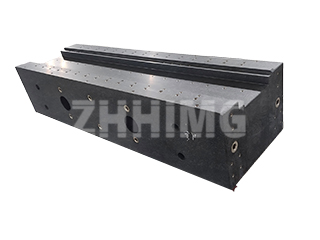Granite precision platforms are renowned for their stability and durability, making them essential for high-precision applications in fields such as metrology and mechanical engineering. However, like many other materials, granite can develop what is known as “internal stress” during its manufacturing process. Internal stress refers to the forces within the material that arise due to uneven cooling, uneven weight distribution, or external impacts during the production stages. This stress can lead to warping, distortion, or even failure of the granite platform over time if not properly managed.
The presence of internal stress in granite is a common issue that can compromise the accuracy and longevity of precision platforms. These stresses occur when the granite experiences uneven cooling during its solidification process or when there are variations in the density and composition of the material. The result is that the granite may exhibit slight internal deformations, which could affect its flatness, stability, and overall structural integrity. In highly sensitive applications, even the smallest distortions can introduce measurement errors and affect the performance of the entire system.
Eliminating internal stress during production is critical for ensuring the high precision and reliability of granite platforms. One of the most effective methods used in the production of granite precision platforms is a process called “stress relief” or “annealing.” Annealing involves carefully heating the granite to a specific temperature and then allowing it to cool slowly in a controlled environment. This process helps to release the internal stresses that may have built up during the cutting, shaping, and cooling stages of production. The slow cooling process allows the material to stabilize, reducing the risk of deformation and improving its overall strength and uniformity.
Additionally, the use of high-quality, homogeneous granite helps to minimize internal stress from the outset. By sourcing materials with consistent composition and minimal natural flaws, manufacturers can reduce the likelihood of stress concentrations that may later affect the performance of the precision platform.
Another key step in stress reduction is the careful machining and polishing of the granite during the production process. By ensuring that the granite is processed with precision and care, the likelihood of introducing new stresses is minimized. Moreover, during the final stages of production, platforms are often subjected to quality control tests that include measuring the flatness and checking for any signs of distortion caused by internal stress.
In conclusion, while granite precision platforms can develop internal stress during manufacturing, effective methods such as annealing, careful material selection, and precise machining can significantly reduce or eliminate these stresses. By doing so, manufacturers ensure that the platforms maintain their dimensional stability, accuracy, and long-term reliability, which are critical in high-precision industrial applications. By understanding and addressing internal stress, granite precision platforms can continue to meet the stringent demands of industries that rely on them for precision measurement and high-performance operations.
Eliminating internal stress is not just a matter of improving the platform’s performance but also of safeguarding the longevity and durability of the equipment that depends on these platforms for accurate results.
Post time: Oct-20-2025

